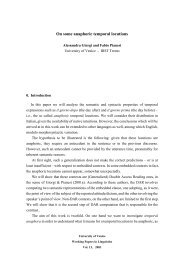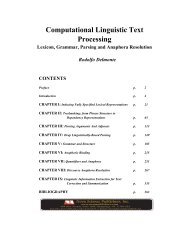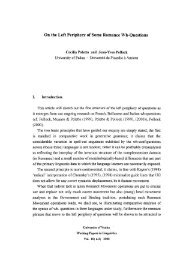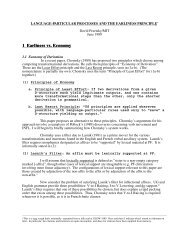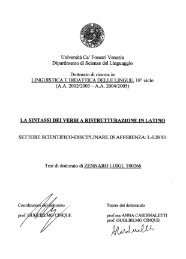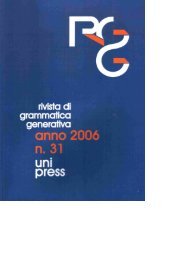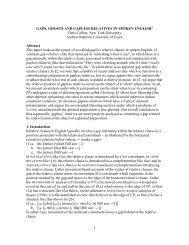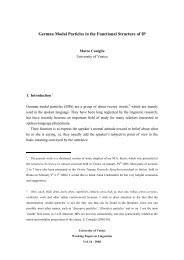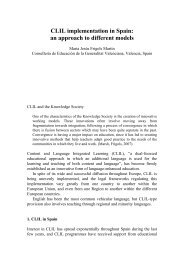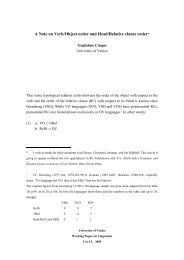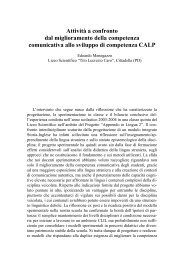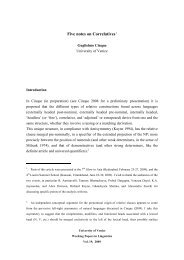A Grammar of Italian Sequence of Tense - Lear
A Grammar of Italian Sequence of Tense - Lear
A Grammar of Italian Sequence of Tense - Lear
You also want an ePaper? Increase the reach of your titles
YUMPU automatically turns print PDFs into web optimized ePapers that Google loves.
150<br />
A <strong>Grammar</strong> <strong>of</strong> <strong>Italian</strong> <strong>Sequence</strong> <strong>of</strong> <strong>Tense</strong><br />
As I discussed above, a main sentence with an imperfect verbal form obligatorily<br />
requires a temporal topic. According to the hypothesis I developed in section 4.3, this<br />
effect stems from the anti-speaker requirement <strong>of</strong> the imperfect. The imperfect can<br />
never be directly related to the speaker’s temporal coordinate, and when this is<br />
unavoidable, as in a main clause such as (102), the relation must be mediated by a<br />
temporal adverb. Note that example (102) could be acceptable as is, provided that a<br />
temporal topic is understood, because given in the preceding discourse.<br />
Hence, in example (101), where the temporal topic is overtly provided, the imperfect<br />
can be temporally located with respect to it, in a way analogous to sentence (103). In<br />
example (100) this could still be possible, if the discourse provides for such a temporal<br />
topic, paralleling in this case the status <strong>of</strong> sentence (102).<br />
Consider finally the future-in-the-past. An event in a complement clause, endowed with<br />
future-in-the-past morphology, is not evaluated against the speaker’s temporal<br />
coordinate, but only with respect to the subject’s. However, if an indexical temporal<br />
adverb appears, then the future-in-the-past event can be located accordingly:<br />
(104) Gianni ha detto che Maria sarebbe partita domani<br />
Gianni said that Maria would leave tomorrow<br />
In sentence (104) the leaving event is located by means <strong>of</strong> the indexical temporal adverb<br />
tomorrow. In a relative clause, however, the future-in-the-past is not compatible with<br />
future oriented indexical adverbs:<br />
(105) Gianni ha invitato la donna che avrebbe comprato un vestito rosso *domani<br />
Gianni invited the woman who would buy a red dress *tomorrow<br />
The only possible temporal locutions in this case are the anaphoric ones:<br />
(106) Gianni ha invitato la donna che avrebbe comprato un vestito rosso il giorno dopo<br />
Gianni invited the woman who would buy a red dress the next day<br />
I propose that this different distribution <strong>of</strong> temporal locutions with the future-in-the-past<br />
can be explained by means <strong>of</strong> the consideration that this verbal form, contrary to the<br />
imperfect, is not available in main assertions, independently <strong>of</strong> the temporal locution:



